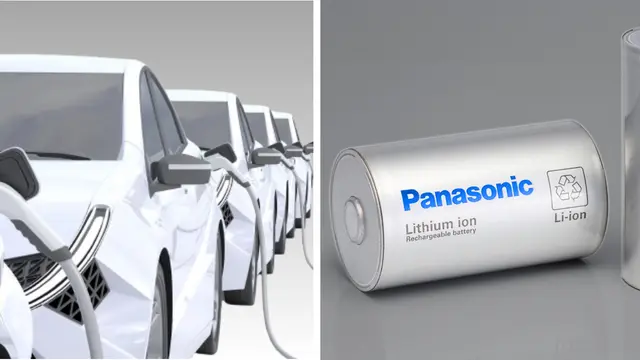Panasonic is on the verge of transforming the electric vehicle (EV) industry with the impending mass production of its highly-anticipated 4680 battery cells.
Designed to dramatically enhance range, power, charging speeds, and efficiency, these new cells promise a substantial leap over the current technology while also slashing production costs.

The 4680 cells—named for their dimensions of 46 mm in diameter and 80 mm in length—are a sizable upgrade from the conventional 2170 cells widely used in EVs today.
Each 4680 cell stores five times more energy than smaller cells, thanks to its larger size and advanced cylindrical lithium-ion technology, developed with Panasonic’s 30 years of expertise.
While this doesn’t translate into a direct 500% increase in vehicle range, the efficiency gains at the system level are impressive.
These cells require less supporting material, making EV battery packs lighter and more compact.
This leads to multiple benefits, including higher peak power delivery, faster charging capabilities, improved thermal management, and reduced overall costs.
Mass production of the 4680 cells will commence at Panasonic’s Wakayama factory in Western Japan, a facility that now stands as the company’s flagship for next-generation battery technology.

Approximately 400 staff will work on the development and production of these cells starting in March 2025, setting a new industry benchmark.
“I am excited that we are ready to start the mass production of the cutting-edge 4680 cell,” said Kazuo Tadanobu, president and executive officer at Panasonic Energy.
“This milestone is the result of years of expertise in cylindrical lithium-ion battery manufacturing.
I’m confident it will significantly revolutionize the battery and EV industry.
As we add the 4680 cell to our lineup, we’ll cater to a broader range of needs, further promoting the use of EVs and advancing our mission of fostering a sustainable society.”
Panasonic’s Wakayama factory aims to be an exemplar of environmentally-friendly manufacturing by maximizing the use of renewable energy sources such as solar and onshore wind power.
This initiative supports the company’s goal of nearly zero CO2 emissions, already achieved at Panasonic’s Moriguchi and Kaizuka factories in Osaka.
By March 2029, Panasonic Energy intends to extend carbon neutrality across all 20 of its global manufacturing bases.
Alongside promoting greener manufacturing, Panasonic has partnered with Sila to incorporate high-performance silicon anode technology, which is set to boost battery energy density by 25%.
This development, although still years from mass production, underscores Panasonic’s commitment to advancing battery technology.
Panasonic’s new 4680 battery cells are poised to make a significant impact, not just in terms of technological advancements but also by making EVs more accessible and affordable to a broader market.
As the company partners with major automakers like Tesla, Lucid, Toyota, and more, the future of electric vehicles is looking brighter and more sustainable than ever.
